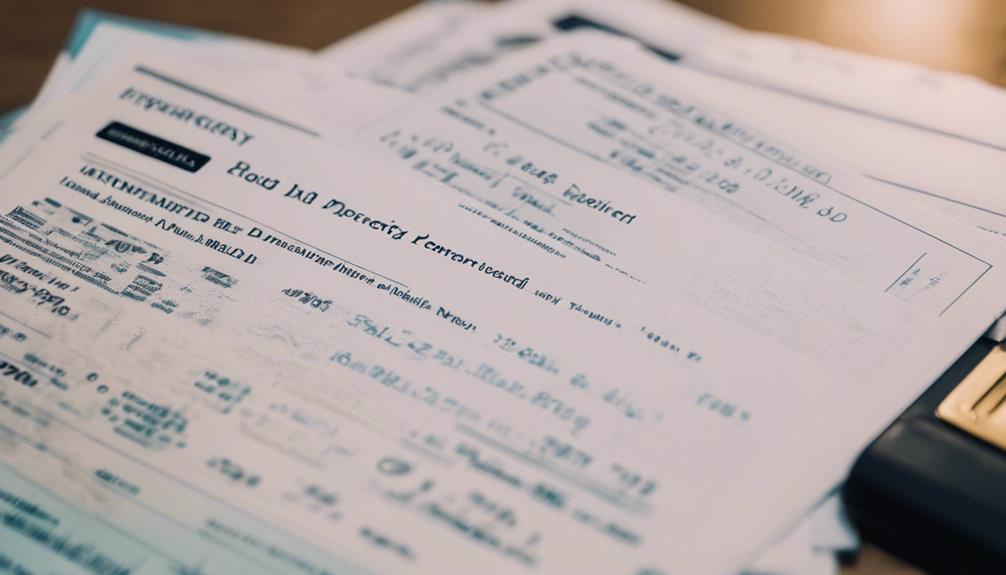For your Pennsylvania Emergency Medicaid application, you'll need government-issued photo ID, Social Security proof, and income verification such as pay stubs or tax returns. Medical necessity requires physician certification, treatment plans, and medical records. Confirm citizenship with a birth certificate and establish residency with valid address documentation. Additional documents like bank statements or medical records bolster your eligibility. Having these documents ready expedites the process and ensures you receive timely medical assistance.
Required Personal Identification Documents
What personal identification documents are required for an Emergency Medicaid application?
When initiating the application process for Emergency Medicaid, it's crucial to ensure you have the necessary identification requirements in place. Typically, you'll need to provide a valid form of government-issued photo identification, such as a driver's license or passport, to verify your identity.
Additionally, you may be asked to provide your Social Security card or a document containing your Social Security number to confirm your eligibility for benefits.
Ensuring that you have the appropriate identification documents ready when applying for Emergency Medicaid is essential to expedite the process and prevent any delays in receiving the necessary medical assistance.
Proof of Income and Resources
When applying for Emergency Medicaid, you must provide documentation demonstrating your income and available resources. Income verification is crucial in determining your eligibility for assistance. This can be done by submitting recent pay stubs, tax returns, or a letter from your employer indicating your wages. If you're unemployed, you may need to provide proof of any unemployment benefits or other forms of income.
Additionally, asset documentation is required to assess your financial situation accurately. This includes bank statements, investment accounts, property deeds, and information on any other valuable assets you own. Providing detailed information about your resources is essential for the application process.
It is important to ensure that all income and asset documentation is current and complete. Incomplete or outdated information can delay the processing of your Emergency Medicaid application.
Medical Necessity Documentation
To further support your Emergency Medicaid application, it's imperative to provide documentation that establishes the medical necessity for the services or treatments you're seeking. This can be achieved through physician certification, which should clearly outline the reasons why the treatment is essential for your health. The physician's certification should also include a detailed treatment plan that outlines the specific services or procedures needed.
In addition to physician certification and treatment plans, including relevant medical records and diagnostic tests in your application is crucial. Medical records provide a comprehensive overview of your medical history and current health status, while diagnostic tests offer objective evidence of the medical conditions that require immediate attention.
These documents help demonstrate the urgency and necessity of the medical services or treatments you're applying for.
Citizenship and Residency Verification
For Emergency Medicaid application processing, verifying your citizenship and residency status is a critical step that requires specific documentation. Citizenship proof is essential and can be confirmed through documents such as a birth certificate, passport, or naturalization certificate. These documents establish your legal status as a citizen or qualified immigrant in the United States.
Residency verification is equally important and typically involves providing documents that confirm your current address, such as a utility bill, lease agreement, or driver's license. These documents serve to confirm that you reside in the state where you're applying for Emergency Medicaid benefits. Address confirmation is crucial as it helps ensure that you're seeking assistance in the correct jurisdiction.
Additional Supporting Documents
Include supplementary documentation that supports your Emergency Medicaid application to strengthen your eligibility verification. Supporting evidence plays a crucial role in meeting the eligibility requirements for Emergency Medicaid.
To enhance your application, consider providing documents such as pay stubs, bank statements, or tax returns to demonstrate your financial need. Medical records, doctor's notes, or hospital bills can serve as supporting evidence of your medical condition and the necessity for urgent healthcare services.
These additional documents can further validate your eligibility for Emergency Medicaid and expedite the verification process.
If you require assistance with your application, reaching out to Medicaid representatives or seeking help from healthcare providers can streamline the process. These professionals can guide you on the specific supporting documents needed to bolster your application and ensure a smoother verification process.
Conclusion
In conclusion, gathering all necessary documentation for your Pennsylvania emergency Medicaid application is crucial to ensure a smooth and successful process. By providing the required personal identification, proof of income, medical necessity documentation, citizenship/residency verification, and any additional supporting documents, you'll greatly increase your chances of approval.
Remember, the early bird gets the worm, so don't delay in gathering all your paperwork to expedite your application.
